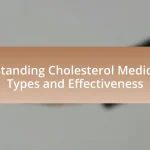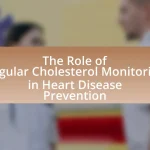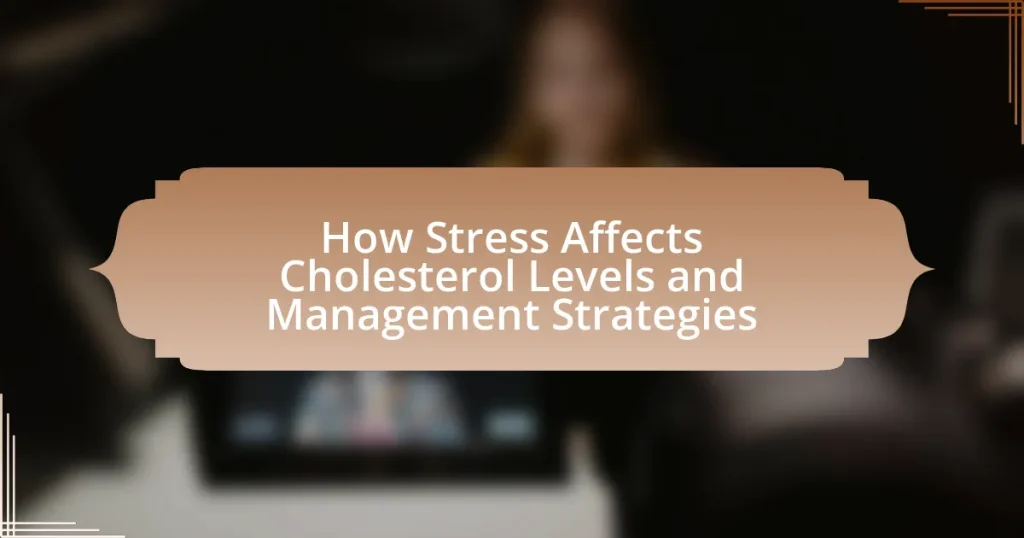The article examines the relationship between stress and cholesterol levels, highlighting how stress hormones like cortisol and adrenaline can elevate cholesterol production and alter lipid metabolism. It discusses the physiological mechanisms linking stress to increased low-density lipoprotein (LDL) cholesterol and decreased high-density lipoprotein (HDL) cholesterol, contributing to cardiovascular risks. The article also explores the impact of psychological and physical stressors, the differences between acute and chronic stress, and the health implications of high cholesterol due to stress. Furthermore, it outlines effective stress management techniques and lifestyle changes, such as diet and exercise, that can help improve cholesterol levels and overall cardiovascular health.
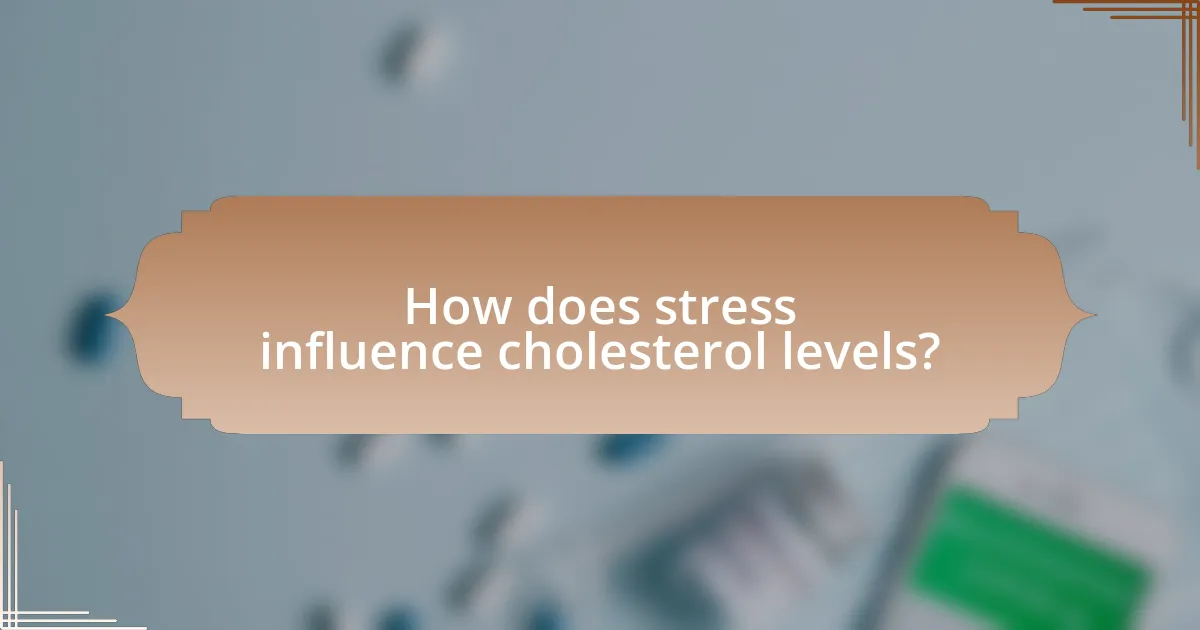
How does stress influence cholesterol levels?
Stress increases cholesterol levels primarily by triggering the release of stress hormones such as cortisol and adrenaline. These hormones can lead to increased production of cholesterol in the liver and promote the mobilization of fatty acids from fat tissues, which can elevate blood cholesterol levels. Research indicates that chronic stress is associated with higher levels of low-density lipoprotein (LDL) cholesterol and lower levels of high-density lipoprotein (HDL) cholesterol, contributing to cardiovascular risk. A study published in the Journal of Clinical Endocrinology & Metabolism found that individuals experiencing high stress had significantly elevated cholesterol levels compared to those with lower stress levels, highlighting the direct impact of stress on lipid metabolism.
What physiological mechanisms link stress and cholesterol?
Stress increases cholesterol levels primarily through the activation of the hypothalamic-pituitary-adrenal (HPA) axis, which leads to elevated cortisol production. Cortisol, a stress hormone, promotes lipolysis and increases the synthesis of low-density lipoprotein (LDL) cholesterol in the liver. Additionally, stress can lead to unhealthy behaviors such as poor diet and lack of exercise, further exacerbating cholesterol levels. Research indicates that chronic stress correlates with higher total cholesterol and LDL cholesterol levels, as evidenced by a study published in the Journal of Clinical Endocrinology & Metabolism, which found that individuals with high stress levels had significantly elevated cholesterol profiles.
How does the body’s stress response affect lipid metabolism?
The body’s stress response negatively affects lipid metabolism by increasing the levels of cortisol, which promotes lipolysis and alters lipid profiles. Elevated cortisol levels lead to increased free fatty acids in the bloodstream, which can contribute to insulin resistance and dyslipidemia. Research indicates that chronic stress is associated with higher triglyceride levels and lower HDL cholesterol, as demonstrated in a study published in the Journal of Clinical Endocrinology & Metabolism, which found that individuals under prolonged stress exhibited significant changes in lipid metabolism.
What role do hormones play in stress-related cholesterol changes?
Hormones play a critical role in stress-related cholesterol changes by influencing lipid metabolism and regulation. During stress, the body releases hormones such as cortisol and adrenaline, which can lead to increased cholesterol levels. Cortisol, a glucocorticoid hormone, promotes the mobilization of fatty acids and glucose, resulting in elevated low-density lipoprotein (LDL) cholesterol and triglycerides. Studies have shown that chronic stress and elevated cortisol levels are associated with dyslipidemia, characterized by increased total cholesterol and LDL cholesterol levels. This hormonal response to stress can contribute to the development of cardiovascular diseases, as evidenced by research indicating that individuals with high stress levels often exhibit unfavorable lipid profiles.
What types of stress are most impactful on cholesterol levels?
Psychological stress and physical stress are the types of stress most impactful on cholesterol levels. Psychological stress, such as anxiety and depression, can lead to increased levels of cortisol, which is associated with higher LDL cholesterol and lower HDL cholesterol. Physical stress, including chronic illness or intense exercise, can also affect cholesterol metabolism, potentially leading to elevated cholesterol levels. Research indicates that individuals experiencing high levels of psychological stress have a significantly higher risk of developing dyslipidemia, which is characterized by abnormal cholesterol levels.
How does acute stress differ from chronic stress in its effects?
Acute stress triggers immediate physiological responses, such as increased heart rate and heightened alertness, while chronic stress leads to prolonged activation of the stress response, resulting in negative health outcomes like elevated cholesterol levels. Acute stress can temporarily boost cholesterol levels due to the release of stress hormones like cortisol and adrenaline, which mobilize energy reserves. In contrast, chronic stress maintains elevated cortisol levels over time, contributing to dyslipidemia and increasing the risk of cardiovascular diseases. Research indicates that chronic stress is associated with higher LDL cholesterol and lower HDL cholesterol, exacerbating health risks (American Heart Association, 2021).
What psychological stressors are linked to cholesterol issues?
Psychological stressors linked to cholesterol issues include chronic stress, anxiety, and depression. Chronic stress activates the body’s fight-or-flight response, leading to increased production of cortisol, which can elevate cholesterol levels. Research indicates that individuals experiencing high levels of anxiety often have higher low-density lipoprotein (LDL) cholesterol and lower high-density lipoprotein (HDL) cholesterol. Additionally, depression has been associated with dyslipidemia, where abnormal lipid levels can contribute to cardiovascular disease. A study published in the Journal of Clinical Psychiatry found that individuals with major depressive disorder had significantly higher total cholesterol levels compared to those without depression, highlighting the direct impact of psychological stressors on cholesterol management.

Why is understanding the relationship between stress and cholesterol important?
Understanding the relationship between stress and cholesterol is important because stress can significantly influence cholesterol levels, impacting cardiovascular health. Chronic stress triggers the release of hormones like cortisol, which can lead to increased production of low-density lipoprotein (LDL) cholesterol and decreased high-density lipoprotein (HDL) cholesterol. Research indicates that individuals experiencing high levels of stress are at a greater risk for developing heart disease, as elevated cholesterol levels are a known risk factor. For instance, a study published in the Journal of the American College of Cardiology found that psychological stress is associated with higher cholesterol levels, underscoring the need for effective stress management strategies to maintain healthy cholesterol levels and reduce cardiovascular risk.
What are the health implications of high cholesterol due to stress?
High cholesterol due to stress can lead to significant health implications, including an increased risk of cardiovascular diseases such as heart attacks and strokes. Stress triggers the release of hormones like cortisol, which can elevate cholesterol levels by promoting the liver’s production of cholesterol and reducing its clearance from the bloodstream. Research indicates that individuals with chronic stress have a higher likelihood of developing atherosclerosis, a condition characterized by the buildup of fatty deposits in arteries, which can obstruct blood flow. Furthermore, high cholesterol levels can contribute to hypertension, increasing the strain on the heart and potentially leading to heart failure over time.
How does elevated cholesterol contribute to cardiovascular disease?
Elevated cholesterol contributes to cardiovascular disease by promoting the formation of atherosclerotic plaques in the arteries. When low-density lipoprotein (LDL) cholesterol levels are high, it leads to the accumulation of fatty deposits on arterial walls, which narrows the arteries and restricts blood flow. This process is supported by studies indicating that high LDL cholesterol is a significant risk factor for heart attacks and strokes, as it can lead to plaque rupture and subsequent clot formation. According to the American Heart Association, individuals with high LDL cholesterol are at a greater risk of developing cardiovascular diseases, highlighting the direct link between elevated cholesterol levels and cardiovascular health.
What are the long-term effects of stress-induced cholesterol changes?
Long-term effects of stress-induced cholesterol changes include an increased risk of cardiovascular diseases, such as heart attacks and strokes. Chronic stress elevates levels of cortisol, which can lead to higher low-density lipoprotein (LDL) cholesterol and lower high-density lipoprotein (HDL) cholesterol. Research indicates that individuals experiencing prolonged stress may have a 50% higher risk of developing heart disease compared to those with lower stress levels, as noted in a study published in the Journal of the American College of Cardiology. Additionally, elevated cholesterol levels can contribute to atherosclerosis, a condition characterized by the buildup of plaques in arteries, further increasing cardiovascular risk.
How can managing stress improve cholesterol levels?
Managing stress can improve cholesterol levels by reducing the production of stress hormones, which can negatively impact lipid metabolism. Chronic stress leads to elevated levels of cortisol, a hormone that can increase LDL (bad cholesterol) and decrease HDL (good cholesterol). Studies have shown that stress management techniques, such as mindfulness and exercise, can lower cortisol levels and subsequently improve cholesterol profiles. For instance, a study published in the Journal of Clinical Lipidology found that participants who engaged in stress-reduction programs experienced significant improvements in their cholesterol levels, demonstrating a direct link between effective stress management and better lipid profiles.
What lifestyle changes can help reduce stress and cholesterol?
Regular physical activity, a balanced diet, and effective stress management techniques can significantly reduce stress and cholesterol levels. Engaging in at least 150 minutes of moderate aerobic exercise weekly can lower LDL cholesterol and improve overall heart health. A diet rich in fruits, vegetables, whole grains, and healthy fats, such as those found in nuts and olive oil, has been shown to lower cholesterol levels. Additionally, practices such as mindfulness, yoga, and deep-breathing exercises can effectively reduce stress, which is linked to higher cholesterol levels. Studies indicate that individuals who incorporate these lifestyle changes experience improved cholesterol profiles and reduced stress-related health issues.
How effective are stress management techniques in cholesterol control?
Stress management techniques are effective in cholesterol control, as they can lead to reductions in stress-related hormonal responses that negatively impact lipid levels. Research indicates that chronic stress elevates cortisol levels, which can increase LDL cholesterol and decrease HDL cholesterol. A study published in the Journal of Clinical Lipidology found that individuals who engaged in stress reduction practices, such as mindfulness and cognitive behavioral therapy, experienced significant improvements in their cholesterol profiles. Specifically, participants showed a reduction in total cholesterol and LDL levels after implementing these techniques over a sustained period. Thus, incorporating stress management strategies can be a beneficial component of cholesterol management.
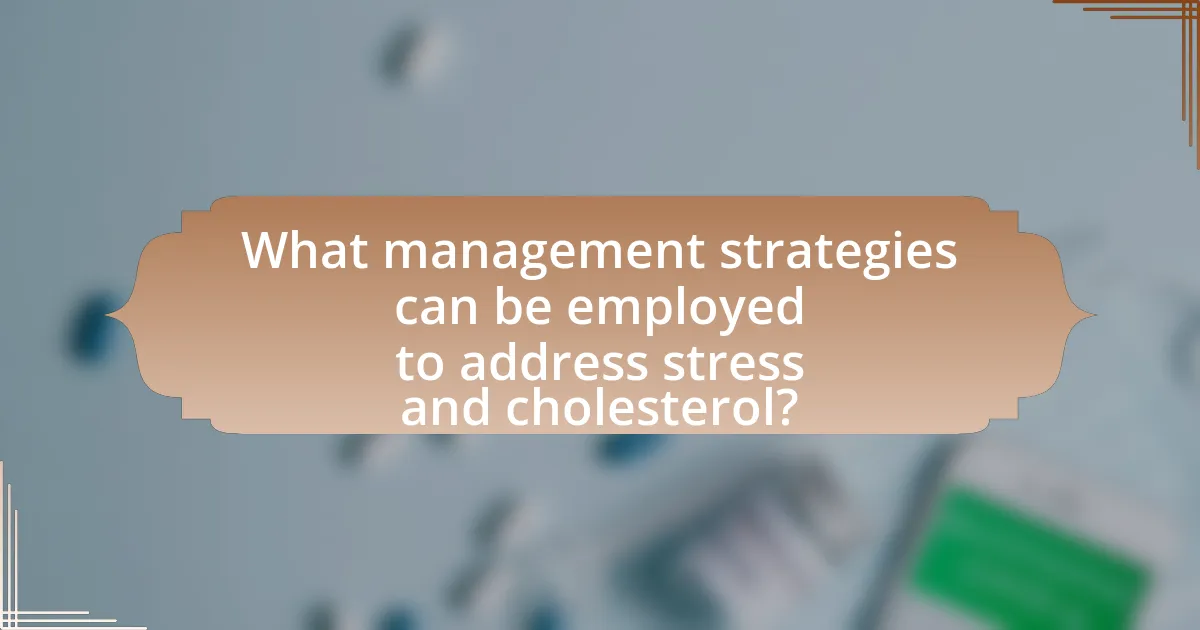
What management strategies can be employed to address stress and cholesterol?
Management strategies to address stress and cholesterol include lifestyle modifications, stress management techniques, and dietary changes. Engaging in regular physical activity, such as aerobic exercises, can lower cholesterol levels and reduce stress by releasing endorphins, which improve mood. Mindfulness practices, including meditation and yoga, have been shown to effectively reduce stress and may also positively influence cholesterol levels by promoting overall heart health. Additionally, adopting a heart-healthy diet rich in fruits, vegetables, whole grains, and healthy fats can help manage cholesterol levels while also reducing stress. Research indicates that these combined approaches can lead to significant improvements in both stress and cholesterol management, as evidenced by studies showing that lifestyle interventions can lower LDL cholesterol and improve psychological well-being.
What are the most effective stress management techniques?
The most effective stress management techniques include mindfulness meditation, regular physical exercise, and cognitive-behavioral therapy (CBT). Mindfulness meditation has been shown to reduce stress by promoting relaxation and enhancing emotional regulation, as evidenced by a study published in the journal Health Psychology, which found that participants who practiced mindfulness reported lower stress levels. Regular physical exercise, such as aerobic activities, has been proven to release endorphins, which improve mood and reduce stress, supported by research from the American Psychological Association indicating that exercise can significantly lower stress levels. Cognitive-behavioral therapy helps individuals identify and change negative thought patterns, effectively reducing stress, as demonstrated in numerous studies, including one published in the Journal of Consulting and Clinical Psychology, which found CBT to be effective in lowering stress and anxiety.
How can mindfulness and meditation impact cholesterol levels?
Mindfulness and meditation can lower cholesterol levels by reducing stress, which is known to negatively impact lipid profiles. Research indicates that stress can lead to increased levels of cortisol, a hormone that may elevate cholesterol levels. A study published in the Journal of the American College of Cardiology found that participants who engaged in mindfulness practices showed significant reductions in total cholesterol and LDL cholesterol after eight weeks. This suggests that incorporating mindfulness and meditation into daily routines can be an effective strategy for managing cholesterol levels through stress reduction.
What role does physical activity play in managing stress and cholesterol?
Physical activity plays a crucial role in managing both stress and cholesterol levels. Engaging in regular exercise reduces stress by promoting the release of endorphins, which are natural mood lifters, and helps to lower cortisol levels, a hormone associated with stress. Additionally, physical activity directly impacts cholesterol by increasing high-density lipoprotein (HDL) cholesterol, often referred to as “good” cholesterol, while simultaneously lowering low-density lipoprotein (LDL) cholesterol, known as “bad” cholesterol. Studies indicate that individuals who engage in moderate-intensity aerobic exercise for at least 150 minutes per week can see significant improvements in their cholesterol profiles and reductions in stress levels.
What dietary changes can support cholesterol management under stress?
Incorporating dietary changes such as increasing soluble fiber intake, consuming healthy fats, and reducing saturated fat can support cholesterol management under stress. Soluble fiber, found in oats, beans, and fruits, helps lower LDL cholesterol levels by binding to cholesterol in the digestive system. Healthy fats, particularly omega-3 fatty acids from sources like fatty fish, walnuts, and flaxseeds, can improve heart health and reduce inflammation, which is crucial during stressful periods. Additionally, limiting saturated fats found in red meat and full-fat dairy products can help maintain healthier cholesterol levels, as excessive intake can raise LDL cholesterol. Studies indicate that a diet rich in these components can effectively manage cholesterol levels, especially when stress is a factor.
Which foods should be included or avoided for better cholesterol levels?
To improve cholesterol levels, include foods high in soluble fiber, such as oats, beans, lentils, fruits, and vegetables, while avoiding saturated fats found in red meat and full-fat dairy products. Soluble fiber helps reduce LDL cholesterol by binding to it in the digestive system, facilitating its excretion. Research indicates that a diet rich in these fiber sources can lower cholesterol levels by 5-10% (American Heart Association). Conversely, saturated fats can raise LDL cholesterol levels, contributing to heart disease risk, as evidenced by studies showing that reducing saturated fat intake can lead to significant improvements in cholesterol profiles (Journal of the American College of Cardiology).
How does nutrition interact with stress and cholesterol levels?
Nutrition significantly influences stress and cholesterol levels by affecting metabolic processes and hormonal responses. A diet high in saturated fats and sugars can elevate cholesterol levels, which may exacerbate stress-related health issues. Conversely, a balanced diet rich in omega-3 fatty acids, fiber, and antioxidants can help lower cholesterol and mitigate stress responses. Research indicates that individuals consuming a Mediterranean diet, which emphasizes fruits, vegetables, whole grains, and healthy fats, experience lower stress levels and improved cholesterol profiles. For instance, a study published in the journal “Nutrients” found that adherence to a Mediterranean diet is associated with reduced anxiety and lower LDL cholesterol levels, highlighting the critical role of nutrition in managing both stress and cholesterol.
What practical tips can help individuals manage stress and cholesterol effectively?
To manage stress and cholesterol effectively, individuals should adopt a balanced lifestyle that includes regular physical activity, a heart-healthy diet, and stress-reduction techniques. Engaging in at least 150 minutes of moderate aerobic exercise weekly can lower cholesterol levels and alleviate stress, as physical activity releases endorphins that improve mood. Consuming a diet rich in fruits, vegetables, whole grains, and healthy fats, such as those found in nuts and olive oil, can help maintain healthy cholesterol levels; studies show that diets high in fiber can reduce LDL cholesterol by 5-10%. Additionally, practicing mindfulness, meditation, or yoga can significantly reduce stress, which is linked to higher cholesterol levels; research indicates that mindfulness-based stress reduction can lower cortisol levels, thereby positively impacting cholesterol.
